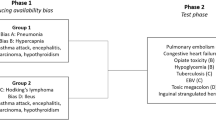Abstract
Since cognitive abilities have been shown to decrease with age, it is expected that older physicians would not perform as well as their younger counterparts on clinical cases unless their expertise can counteract the cognitive effects of aging. However, studies on the topic have shown contradictory results. This study aimed to further investigate the effect of aging on physicians’ diagnostic accuracy when diagnosing prevalent and less prevalent cases based on clinical vignettes. A mixed design was used to assess the influence of case prevalence (high vs. low) as a within-subjects factor, and age group as a between subjects factor (<30; n = 23, 30–39; n = 19, 40–49; n = 27, >50 years old; n = 19) on the diagnostic accuracy of 65 family physicians and 25 residents. Repeated Measure ANOVA revealed a significant effect of case prevalence (p < .001) and age group (p < .001). Post-hoc analyses revealed that younger physicians showed the best performance. This study did not demonstrate the positive effect of experience in older physicians. In line with previous studies on expertise development, findings of the present study suggest that skills should be actively maintained to assure a high performance level throughout one’s lifespan. If not, performance level could gradually decline with age.
Similar content being viewed by others
References
Baddeley, A. D. (2002). Is working memory still working? European Psychologist, 7, 85–97.
Coderre, S. P., Harasym, P., Mandin, H., & Fick, G. (2004). The impact of two multiple-choice question formats on the problem-solving strategies used by novices and experts. BMC Medical Education, 4(1), 23.
Collier, R. (2008). Diagnosing the aging physician. Canadian Medical Association Journal, 178, 1121–1123.
Elstein, A. S. (1995). Clinical reasoning in medicine. In J. Higgs & M. A. Jones (Eds.), Clinical reasoning in the health professions (pp. 49–59). Woburn, MA: Butterworth-Heinemann.
Ericsson, K. A. (2004). Deliberate practice and the acquisition and maintenance of expert performance in medicine and related domains. Academic Medicine, 79, S70–S81.
Eva, K. W. (2002). The aging physician: Changes in cognitive processing and their impact on the medical practice. Academic Medicine, 77, S1–S6.
Eva, K. W. (2003). Stemming the tide: Cognitive aging theories and their implications for continuing education in the health professions. The Journal of Continuing Education in the Health Professions, 23, 133–140.
Eva, K. W., & Cunnington, J. P. W. (2006). The difficulty with experience: Does practice increase susceptibility to premature closure. Journal of Continuing Education in the Health Professions, 26, 192–198.
Eva, K. W., Link, C. L., Lutfey, K. E., & McKinlay, J. B. (2010). Swapping horses midstream: Factors related to physicians’ changing their minds about a diagnosis. Academic Medicine, 85, 112–117.
Graber, M. L., Franklin, N., & Gordon, R. (2005). Diagnostic error in internal medicine. Archives of Internal Medicine, 165, 1493–1499.
Grossmann, I., Na, J., Varnum, M. E., Park, D. C., Kitayama, S., & Nisbett, R. E. (2010). Reasoning about social conflicts improves into old age. Proceedings of the National Academy of Sciences, 107, 7246–7250.
Kray, J., & Lindenberger, U. (2000). Adult age differences in task switching. Psychology and Aging, 15, 126–147.
Kulasegaram, K. M., Grierson, L. M., & Norman, G. R. (2013). The roles of deliberate practice and innate ability in developing expertise: Evidence and implications. Medical Education, 47(10), 979–989.
Longo, D. L., Fauci, A. S., Kasper, D. L., Hauser, S. L., Jameson, J. L., & Loscalzo, J. (Eds.). (2011). Harrison’s principles of internal medicine (18th ed.). New York: McGraw-Hill Companies Inc.
Lovelace, E. A. (1990). Aging and cognition: Mental processes, self-awareness, and interventions. Amsterdam: Elsevier Science Publishers B.V.
Mamede, S., Schmidt, H. G., & Penaforte, J. C. (2008a). Effect of reflective practice on the accuracy of medical diagnoses. Medical Education, 42, 468–475.
Mamede, S., Schmidt, H. G., Rikers, R. M. J. P., Penaforte, J. C., & Coelho-Filho, J. M. (2008b). Influence of perceived difficulty of cases on physicians’ diagnostic reasoning. Academic Medicine, 83, 1210–1216.
McLaughlin, K., Rikers, R. M., & Schmidt, H. G. (2008). Is analytic information processing a feature of expertise in medicine? Advances in Health Sciences Education, 13(1), 123–128.
Norman, G. R., & Brooks, L. R. (1997). The non-analytical basis of clinical reasoning. Advances in Health Sciences Education, 2, 173–184.
Peisah, C., & Wilhelm, K. (2007). Physician don’t heal thyself: A descriptive study of impaired older doctors. International Psychogeriatrics, 19, 974–984.
Rikers, R. M., Schmidt, H. G., & Boshuizen, H. P. (2000). Knowledge encapsulation and the intermediate effect. Contemporary Educational Psychology, 25(2), 150–166.
Salthouse, T. A. (1996). The processing-speed theory of adult age differences in cognition. Psychological Review, 103, 403–428.
Schiff, G. D., Hasan, O., Kim, S., Abrams, R., Cosby, K., Lambert, B. L., et al. (2009). Diagnostic error in medicine: Analysis of 583 physician-reported errors. Archives of Internal Medicine, 169, 1881–1887.
Schmidt, H. G., & Rikers, R. M. J. P. (2007). How expertise develops in medicine: Knowledge encapsulation and illness script formation. Medical Education, 41, 1133–1139.
Tsai, T. C., Harasym, P. H., Coderre, S., McLaughlin, K., & Donnon, T. (2009). Assessing ethical problem solving by reasoning rather than decision making. Medical Education, 43(12), 1188–1197.
Turnbull, J., Carbotte, R., Hanna, E., Norman, G., Cunnington, J., Ferguson, B., & Kaigas, T. (2000). Cognitive difficulty in physicians. Academic Medicine, 75, 177–181.
Turnbull, J., Cunnington, J., Unsal, A. C. P., Norman, G., & Ferguson, B. (2006). Competence and cognitive difficulty in physicians: A follow-up study. Academic Medicine, 81, 915–918.
Author information
Authors and Affiliations
Corresponding author
Rights and permissions
About this article
Cite this article
St-Onge, C., Landry, M., Xhignesse, M. et al. Age-related decline and diagnostic performance of more and less prevalent clinical cases. Adv in Health Sci Educ 21, 561–570 (2016). https://doi.org/10.1007/s10459-015-9651-8
Received:
Accepted:
Published:
Issue Date:
DOI: https://doi.org/10.1007/s10459-015-9651-8




